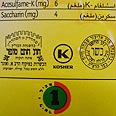
Kosher certificate
צילום: גבי מנשה
US rabbi aims to enhance kosher conditions
'How can you sit at your table and eat a product packaged by a pregnant woman who has been standing on her feet all day?' Rabbi Morris Allen of Minnesota asks amid allegations of worker abuse at US' biggest kosher slaughterhouse
Very little goes unexamined in the kosher world.
From meat and poultry to the coating on vegetables and the ingredients in mouthwash, rabbis who determine whether a product meets Jewish dietary laws scrutinize the most minute details about all things consumed.
For religiously observant Jews, that concern has rarely extended beyond the product itself.
But now, allegations of worker abuse at the nation's biggest kosher slaughterhouse have some Jews demanding that food companies be judged not just by the purity of their products but by the way they treat their employees.
''How can you sit at your table and eat a product packaged by a pregnant woman who has been standing on her feet all day?'' asked Rabbi Morris Allen of Minnesota. He is developing a certification program that aims to protect workers and the environment in the kosher industry.
Interest in Allen's hekhsher tzedek, or ''certificate of righteousness,'' has ballooned since a May 12 immigration raid at Agriprocessors in Postville, Iowa.
Nearly 400 illegal immigrants were arrested at the plant in the biggest such raid on a single work site in US history. State officials say dozens of underage workers were employed there in violation of child labor laws. Agriprocessors has denied any wrongdoing.
Many Jews are embarrassed and angered by the allegations and, along with some religious leaders, are rethinking what it means to be certified kosher.
Certificate's possible effect unclear
The hekhsher tzedek would be awarded to companies that pay fair wages, ensure workplace safety, follow government environmental rules and treat animals humanely, among other criteria.
The program, which could begin as soon as next year, would be separate from the traditional certification process that measures compliance with Jewish dietary law. A company that fails to obtain a hekhsher tzedek could still get its food certified as kosher.
Allen, of Beth Jacob Congregation in Mendota Heights, is developing the program through the United Synagogue for Conservative Judaism and its Rabbinical Assembly, to which he belongs.
It's unclear, however, how much of an effect the certificate would have.
The majority of kosher consumers and certifiers are Orthodox, and they drive the multibillion-dollar US market. Kosher meat is more expensive than standard food and some fear any changes could increase costs.
Rabbi Menachem Genack, chief kosher executive of the Orthodox Union, the largest US kosher certifier, called the proposed criteria for Allen's certification program ''amorphous.'' He said the Orthodox Union relies on federal and state agencies -- ''who have both the expertise and authority'' -- to monitor plant conditions.
Yet, pressure for change is coming from more than just Conservative Jewish leaders.
Within the Orthodox community, there are signs that Jews in their 20s and 30s are gaining interest in what the Torah says about social justice.
Last year, young Orthodox Jews in New York formed Uri L'Tzedek, an advocacy group on issues such as immigration and labor rights. Leaders of the group, whose name means Awaken to Justice, collected about 2,000 signatures in support of a boycott of Agriprocessors.










